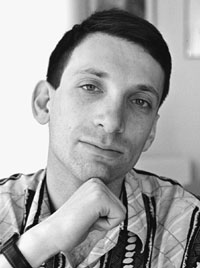Week Without Dorenko

I cannot say that I am delighted as a spectator. I watch Sergei Dorenko’s show very seldom, but I am convinced that he is one of the best television professionals I have ever seen onscreen. Still I am not very much interested in propaganda. I know beforehand what Dorenko will say: things that correspond to the interests of the team, a member of which he once became. I can foresee how he will say it: professionally. Why should I take part in this model propaganda attraction?
However, Sergei Dorenko can survive without my participation. His television electorate cannot even be compared to the audience of other Russian analytical programs. Maybe we should regret that Russian couch potatoes turned lethargic when listening to Nikolai Svanidze and did not understand Yevgeny Kiseliov. But that’s what an audience is. And among it, incidentally, there always were grateful Kremlin spectators — one can imagine the emotional reaction of the coming president to Sergei Dorenko destroying Yevgeny Primakov and Yuri Luzhkov!
However, Sergei Dorenko was not a member of Vladimir Putin’s team. He was a member of Boris Berezovsky’s team. There is certain logic in this. There was a period when this performer did struggle for his ultimate independence. Unsupported by his colleagues, brought to bay by the generals of the small screen, he agreed to the oligarch’s propositions and started to play by his rules. These rules became Dorenko’s rules so quickly that it was hard to understand where his game stopped and where Berezovsky’s game started. And every time Dorenko was taken off the air it meant only that the authorities did not know how to argue with him. They considered it will be better to get rid of him.
Thus it was in the times of anachronistic Premier Yevgeny Primakov. Thus it became at the times of Vladimir Putin. Of course, the president who was offended even with the Kukly (Dolls, puppet mimicry of the rich and famous — Ed.) show and went to a war against his rubber copy was shocked when the cannons of Dorenko’s criticism had turned against him. Thus once again the authorities decide for the citizens what they should watch and listen to.
Authorities who control information totally are doomed in our times of modern technologies, even in the countries where Internet is known only in the capitals and serious newspapers languish in the shadow of tabloids, because the prohibited information and illicit interpretation quickly turns into rumors, jokes, and disrespect for the cowardly officials engaged in struggle against mirrors. This is why a week without Sergei Dorenko’s program is a dangerous week for the future Russian community. We understand this clearly, because for years we have been living in a country whose television has demonstrated its ability to create quality programs of information and analysis — and got rid of them in order not to cause discontent on high. And at present — when it is necessary to explain to the public what the economic reforms are, what the authorities intend, and why unpopular decisions are made, there are no authoritative people left on the boob tube able to say all this. Our week without Dorenko has lasted over a year. Russia’s has just begun. Analyzing our experience, I can testify that such periods help neither the authorities nor those who work in television. Most importantly, they do not help society, hindering its progress, ability to think, compare, make choices, and act.






